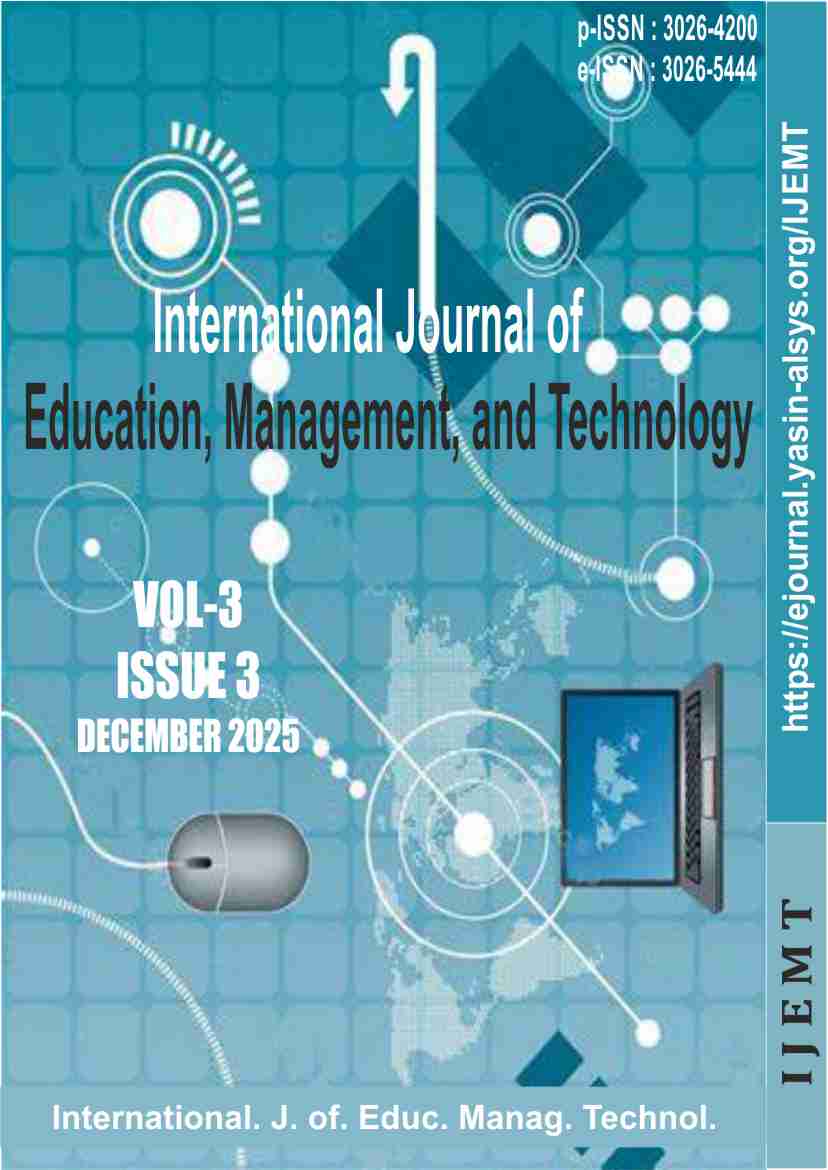Digital Teacher Competence Levels in Elementary Schools on Learning and Knowledge Technologies (LKT)

Main Article Content
Abstract
This study examines the digital competency levels of elementary school teachers in Tecapán, El Salvador, with a focus on their ability to effectively utilize learning and knowledge technologies (LKT) in line with the Common Framework for Teacher Digital Competence (CFTDC). Employing a descriptive research design, data were gathered from a sample of 47 participants, including teachers, principals, and vice principals, using a 21-item online questionnaire. The instrument assessed five core dimensions of digital competence: information and data literacy, communication and collaboration, digital content creation, safety, and problem-solving. Results indicate that 72.2% of respondents demonstrate an intermediate level of digital competence. Notable strengths were observed in communication and collaboration (mean = 13.28), while significant weaknesses were identified in information and data literacy (mean = 6.49). Based on these findings, the study recommends targeted professional development initiatives to address identified gaps, particularly in data literacy and critical information handling. Enhancing teachers’ digital proficiency is essential to promoting equitable access and effective integration of educational technology in elementary learning environments.




Citation Metrics:


Downloads
Article Details

Authors retain copyright and grant the journal right of first publication with the work simultaneously licensed under a Creative Commons Attribution-NonCommercial-ShareAlike 4.0 International License that allows others to share the work with an acknowledgement of the work's authorship and initial publication in this journal.
References
Bentri, A., Hidayati, A., & Kristiawan, M. (2022). Factors supporting digital pedagogical competence of primary education teachers in Indonesia. Frontiers in Education, 7, 829191. https://doi.org/10.3389/feduc.2022.929191
Bokolo, A. Jr., Kamaludin, A., Romli, A., Mat Raffei, A. F., Nincarean, D. A. L. E., Abdullah, A., & Gan, L. M. (2020). Blended learning adoption and implementation in higher education: A theoretical and systematic review. Technology, Knowledge and Learning, 26(4), 803–840. https://doi.org/10.1007/s10758-020-09477-z
Coreas-Flores, E. O., & Romero-Argueta, J. de J. (2024). Academic support of virtual environments perceived by higher education students during Covid-19. The Turkish Online Journal of Educational Technology, 23(4), 8–20. https://tojet.net/articles/v23i4/2342.pdf
Domingo-Coscolla, M., Bosco-Paniagua, A., Carrasco-Segovia, S., & Sánchez-Valero, J.-A. (2019). Fomentando la competencia digital docente en la universidad: Percepción de estudiantes y docentes. Revista de Investigación Educativa, 38(1), 167–182. https://doi.org/10.6018/rie.340551
Domínguez-González, M. D. L. Á., Luque de la Rosa, A., Hervás-Gómez, C., & Román-Graván, P. (2025). Teacher digital competence: Keys for an educational future through a systematic review. Contemporary Educational Technology, 17(2), ep577. https://doi.org/10.30935/cedtech/16168
Gallego Joya, L., Merchán Merchán, M. A., & López Barrera, E. A. (2025). Development and strengthening of teachers’ digital competence: Systematic review. Contemporary Educational Technology, 17(1), ep555. https://doi.org/10.30935/cedtech/15744
García-Vandewalle García, J. M., García-Carmona, M., Trujillo Torres, J. M., & others. (2023). Analysis of digital competence of educators (DigCompEdu) in teacher trainees: The context of Melilla, Spain. TechTrends in Knowledge and Learning, 28(3), 585–612. https://doi.org/10.1007/s10758-021-09546-x
Jimenez, Cristina., Aris, Nuria., Ruiz, Á. M. Magreñán., & Orcos, Lara. (2020). Digital Escape Room, Using Genial.Ly and A Breakout to Learn Algebra at Secondary Education Level in Spain. Education Sciences. http://doi.org/10.3390/EDUCSCI10100271
Joshi, A.., Vinay, M.., & Bhaskar, P. (2020). Impact of coronavirus pandemic on the Indian education sector: perspectives of teachers on online teaching and assessments. Interact. Technol. Smart Educ, 18, 205-226. http://doi.org/10.1108/ITSE-06-2020-0087
König, J.., Jäger-Biela, Daniela J.., & Glutsch, Nina. (2020). Adapting to online teaching during COVID-19 school closure: teacher education and teacher competence effects among early career teachers in Germany. European Journal of Teacher Education, 43, 608 - 622. http://doi.org/10.1080/02619768.2020.1809650
Kuş, Z., & Mert, H. (2024). Digital Competence of Educators in Turkey According to European Digital Competence Framework. Journal of Learning and Teaching in Digital Age, 9(1), 102-114. https://doi.org/10.53850/joltida.1301592
Lie, A., Tamah, S. M., Gozali, I., Triwidayati, K. R., Utami, T. S. D., & Jemadi, F. (2020). Secondary school language teachers’ online learning engagement during the Covid-19 pandemic in Indonesia. Journal of Information Technology Education: Research, 19, 803-832. https://doi.org/10.28945/4626
Mannila L., Nordén L.-Å., Pears A. (2018, August 13–15). Digital competence, teacher self-efficacy and training needs [Conference session]. Proceedings of the 2018 ACM Conference on International Computing Education Research, Espoo, Finland (pp. 78–85). Association for Computing Machinery. http://doi.org/10.1145/3230977.3230993
Palacios-Rodríguez, A., Llorente-Cejudo, C., Lucas, M., & Bem-haja, P. (2025). Macroevaluación de la competencia digital docente. Estudio DigCompEdu en España y Portugal. RIED-Revista Iberoamericana de Educación a Distancia, 28(1), 177–196. https://doi.org/10.5944/ried.28.1.41379
Pegalajar-Palomino, M. C.., Burgos-García, Antonio., & Martínez-Valdivia, Estefanía. (2021). What Does Education for Sustainable Development Offer in Initial Teacher Training? A Systematic Review. Journal of Teacher Education for Sustainability, 23, 99 - 114. http://doi.org/10.2478/jtes-2021-0008
Romero-Argueta, J., Coreas-Flores, E., & Sura-Majano, O. (2025). Use of Mobile Device Apps in Virtual Courses by English as a Foreign Language (EFL) University Students. Asian Journal of Science, Technology, Engineering, and Art, 3(4), 1249-1261. https://doi.org/10.58578/ajstea.v3i4.6482
Sánchez-Cruzado, Cristina., Campión, Raúl Santiago., & Sánchez-Compaña, M. T.. (2021). Teacher Digital Literacy: The Indisputable Challenge after COVID-19. Sustainability. http://doi.org/10.3390/SU13041858
Sulaiman, Jamilah., & Ismail, Siti Noor. (2020). Teacher Competence and 21st Century Skills in Transformation Schools 2025 (TS25). Universal Journal of Educational Research, 8 , 3536-3544 . http://doi.org/10.13189/ujer.2020.080829
Toribio-López, Alexander, Palacios-Núñez, Madeleine Lourdes, Llaque, Paúl, & Deroncele-Acosta, Angel. (2023). Competencia digital en tiempos de covid-19: un análisis bibliométrico. Conrado, 19(90), 15-24. http://scielo.sld.cu/scielo.php?script=sci_arttext&pid=S1990-86442023000100015&lng=es&tlng=es.
Tzafilkou, K., Perifanou, M., & Economides, A. A. (2023). Assessing teachers’ digital competence in primary and secondary education: Applying a new instrument to integrate pedagogical and professional elements for digital education. Education and Information Technologies, 28, 16017–16040. https://doi.org/10.1007/s10639-023-11848-9
Voithofer, R., & Nelson, M. J. (2020). Teacher Educator Technology Integration Preparation Practices Around TPACK in the United States. Journal of Teacher Education, 72(3), 314-328. https://doi.org/10.1177/0022487120949842
Find the perfect home for your research! If this journal isn't the right fit, don't worry—we offer a wide range of journals covering diverse fields of study. Explore our other journals to discover the ideal platform for your work and maximize its impact. Browse now and take the next step in publishing your research:
| HOME | Yasin | AlSys | Anwarul | Masaliq | Arzusin | Tsaqofah | Ahkam | AlDyas | Mikailalsys | Edumalsys | Alsystech | AJSTEA | AJECEE | AJISD | IJHESS | IJEMT | IJECS | MJMS | MJAEI | AMJSAI | AJBMBR | AJSTM | AJCMPR | AJMSPHR | KIJST | KIJEIT | KIJAHRS |















